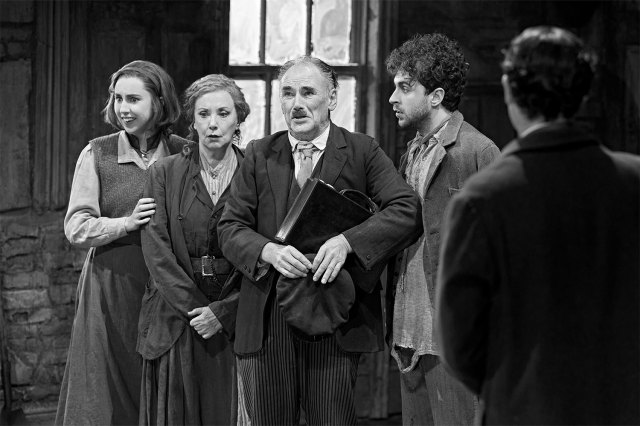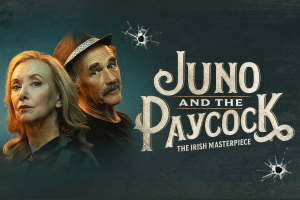Juno and the Paycock review – Mark Rylance and J Smith Cameron fail to spark
Sean O’Casey’s play is revived in the West End for its 100th anniversary

Sometimes plays, like baking, go wrong. The recipe carefully assembled to produce the perfect sponge falls flat as a pancake. This production of Sean O’Casey’s Juno and the Paycock is a case in point.
On paper, the ingredients looked right. Two leading actors, respected on both sides of the Atlantic in the shape of Mark Rylance and J Smith-Cameron (most recently so adored as Gerri in Succession) playing roles they looked destined to nail; a much-respected director in the shape of Matthew Warchus, and a producer, in the form of Sonia Friedman, whose every touch seems golden.
Yet the result is a horrible melange. Everyone on stage seems to be performing in a different version of the play, there is no chemistry, little sense of purpose.
In part, this is thanks to the play itself, written in 1924, and perhaps the most difficult of the author’s “Dublin Trilogy” to stage, thanks to its combustible mixture of comedy and tragedy. But Warchus has chosen to exacerbate its problems, turning the comedic elements into vaudeville farce and tipping the conclusion into portentous solemnity.
The frame is set with jaunty piano music before the fringed music hall curtains swing open. On Rob Howell’s set, a crucifix hangs above the front of a poorly-furnished room in a tenement block suggested by screen prints on the walls above. When Smith-Cameron’s Juno appears, she is both put-upon and dignified, coping with poverty and her difficult children, fiery daughter Mary (Aisling Kearns) and son Johnny (Eimhin Fitzgerald Doherty), who has lost his arm and his confidence thanks to his part in the Easter Rising.
She is awaiting the return of her husband ‘Captain’ Jack, the Paycock of the title, who wastes his days with the terrible chancer Joxer, drinking away their frugal money, refusing to work, lost in tall tales and fantasies. When Rylance’s Jack arrives, he sports a Charlie Chaplin moustache and a swagger; presumably encouraged by Warchus, he plays his lines out to the audience, all rolling eyes and knowing moues. His relationship with Joxer (an excellently venal Paul Hilton, playing it relatively straight and the only one of the supporting cast to make a mark) is like a knockabout music hall double act.
Rylance is funny, but he is never part of the action. He barely looks at Juno, his constant stage-stealing business always centring attention on the sheer ludicrousness of this jumped-up, cowardly man, unwilling and unable to face the reality of his life. When he thinks he has come into some money, his behaviour grows bigger. There is one touching moment at a celebration party when Juno and Mary sing together, but even here, Rylance’s hands, waving in time to the music, pull focus away.
The difficulty with this approach is that it leaves both play and character nowhere to go when the darker shades of O’Casey’s writing and the keening undertow of the Irish Republican movement’s violence begin to rise to the surface. As the play deepens, and the family is torn apart, it’s only the set that breaks – with the arrival of a non-naturalistic pieta striving for the emotion that the production has failed to generate. The ending is also clumsily altered, to suggest something bleaker than Boyle’s final conclusion about a world of chaos.
It’s a deep disappointment on every level, a reminder that star dust can sometimes cloud the picture rather than illuminate it.















